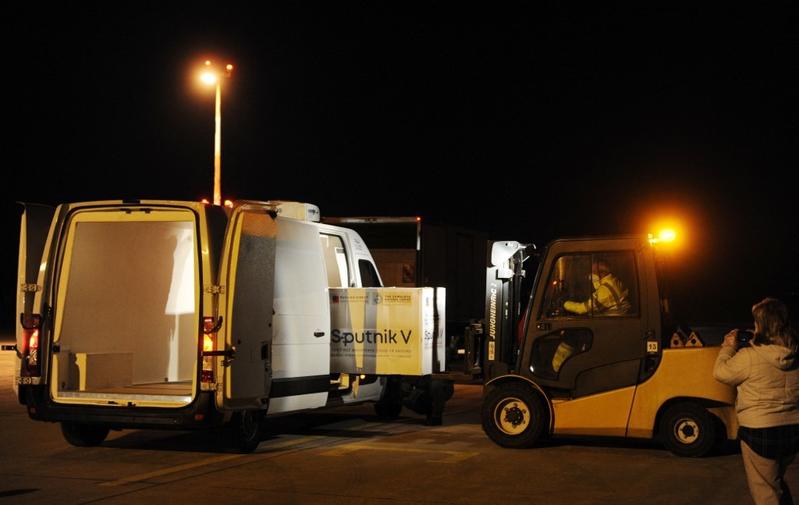 A forklift truck loads boxes containing doses of the Sputnik V vaccine against the coronavirus from Moscow into a van for further transportation, at the International Airport in Kosice, Slovakia, on March 1, 2021. (PETER LAZAR / AFP)
A forklift truck loads boxes containing doses of the Sputnik V vaccine against the coronavirus from Moscow into a van for further transportation, at the International Airport in Kosice, Slovakia, on March 1, 2021. (PETER LAZAR / AFP)
Slovakia’s decision to purchase coronavirus vaccines from Russia sparked a political crisis that’s threatening to tear apart the ruling alliance.
Slovakia’s vaccination effort has so far tracked along the EU average, with 8.4 doses per 100 people delivered, compared with a bloc-wide average of 7.8
The smallest coalition party is weighing whether to quit the coalition led by Prime Minister Igor Matovic and the leader of the SaS party demanded a cabinet revamp. While Matovic would retain a parliamentary majority if either of the groups leaves, both of them exiting would force him into a minority and could bring down the government.
The feud was ignited when on Monday Matovic said that Slovakia will get 2 million doses of the Sputnik V vaccine from Russia, skirting the usual approval from the Slovak or the European Union drug regulator. The announcement drew a rebuke from President Zuzana Caputova and some coalition partners criticized the premier for having made the deal behind their backs and ignoring the EU and NATO member nation’s foreign policy orientation.
ALSO READ: EU vaccine passports for travel still months away, memo shows
“It’s time to talk about government reshuffle,” SaS Chairman Richard Sulik told reporters in Bratislava, according to the news service CTK. “We can hardly continue like this. We’re obviously not managing the battle with the pandemic. The prime minister has turned practically everyone against him: the media, the president, coalition partners and of course the public. We can’t close our eyes to that.”
Matovic’s administration has already been under pressure as it struggles to bring the pandemic under control, which has undercut his popularity just a year after he dominated elections. Even after some early successes in containing the virus, Slovakia is now among the world’s leaders in deaths per capita, according to data compiled by Bloomberg.
The country’s vaccination effort has so far tracked along the EU average, with 8.4 doses per 100 people delivered, compared with a bloc-wide average of 7.8.


